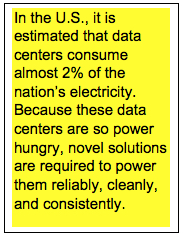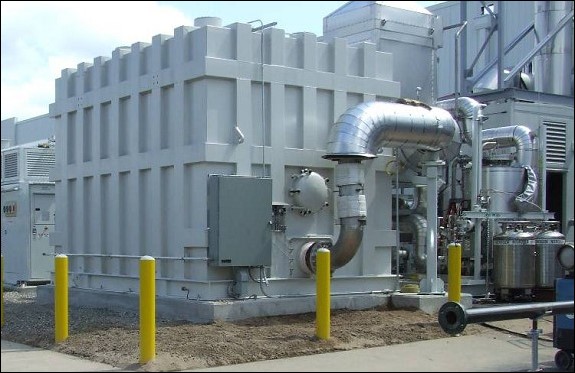Fuel Cells at Data Centers
By: Frank Caprio | On: November 26, 2018

Big Data Needs Big Energy
Today’s topic is fuel cells at data centers. In our increasingly digitized world, the need to process large amounts of data will only become more urgent as technology continues to affect our everyday lives. The Internet of Things (IoT) will continue to evolve, allowing us do nearly everything better. This technology can be used to optimize manufacturing operations, improve equipment monitoring, and predict the need for maintenance better than any time in our history. Where all this will lead is limited only by the imaginations of the technology developers themselves.
continue to evolve, allowing us do nearly everything better. This technology can be used to optimize manufacturing operations, improve equipment monitoring, and predict the need for maintenance better than any time in our history. Where all this will lead is limited only by the imaginations of the technology developers themselves.
This means that the data centers processing this data will increase in number and in size. And, they need power to run the servers. Lots of power. In the U.S., it is estimated that data centers consume almost 2% of the nation’s electricity. Because these data centers are so power hungry, novel solutions are required to power them reliably, cleanly, and consistently. This is why many data centers are designed to operate on fuel cells, which provide clean power in areas not well served by the power grid, while avoiding the intermittency problems associated with wind and solar power. Oh, and fuel cells have no blackouts!
Fuel Cell Types
Once a data center has decided to use fuel cells for power, the decision of which type of fuel cell must then be made. Although fuel cells have been all the rage lately, the term “fuel cell” was first coined in 1889, and evolved into versions that were used in the ‘60s by NASA’s Gemini space program. There are several different types in use today, but they operate around the same principle: electricity is generated by a chemical reaction. Hydrogen atoms are stripped of an electron, which then moves through a wire to produce an electrical current. Oxygen is also required in this process, and reacts with the hydrogen to produce water as a by-product. No emissions are created because no fuels are being ignited, although some fuel cell designs also create some heat and small amounts of carbon dioxide. The other added benefit of fuels cells is that they have no moving parts, so they are relatively maintenance-free and will continue to operate as long as they are supplied with hydrogen and oxygen. The process requires an electrolyte, which carries electrically charged particles from one electrode to the other, and a catalyst to speed up the reaction.
There are different styles of fuel cells, each with different fuel sources, electrolytes, or catalysts. The two preferred fuel cell types for data centers are the Proton Exchange Membrane (PEM) fuel cell and the Solid Oxide fuel cell. PEM fuel cells run on hydrogen, and produce only water as a by-product. While they are a very clean energy source, there are challenges producing and storing the hydrogen they use. Solid Oxide fuel cells can run on natural gas, and can handle large power loads. However, they require the hydrogen to be separated from the methane in natural gas, which is typically accomplished by the use of a reformer. These reformers often use steam to produce the hydrogen atoms that power the fuel cell, and require metal hoses and expansion joints because of the high temperatures encountered.

A metal universal expansion joint on a fuel cell
Where the Future Leads…
While the hoses and expansion joints supplied on these units are carefully designed and produced, they signify a great future opportunity for our industry. Even as fossil fuel-fired power plants are rapidly disappearing, they are increasingly being replaced by cleaner, sustainable power sources. Fuel cells will continue to play an important role as a future source of clean, dependable energy, and almost all designs incorporate flexible metal hoses and expansion joints. Contact us and let’s work together to make sure your customer has access to the best flexible metal piping components available. If you have companies working with fuels cells in your area, don’t pass up the opportunity to get on their approved vendor list. Our future depends on it!
Copyright 2018, Hose Master, LLC
All Rights Reserved

